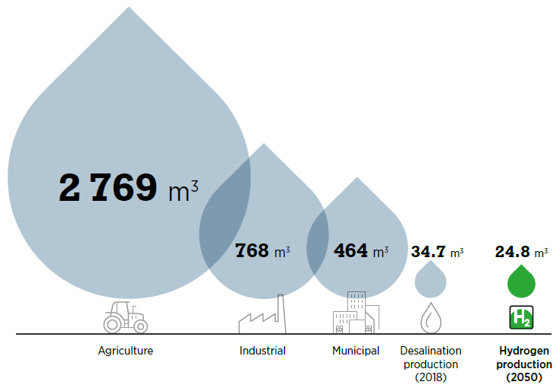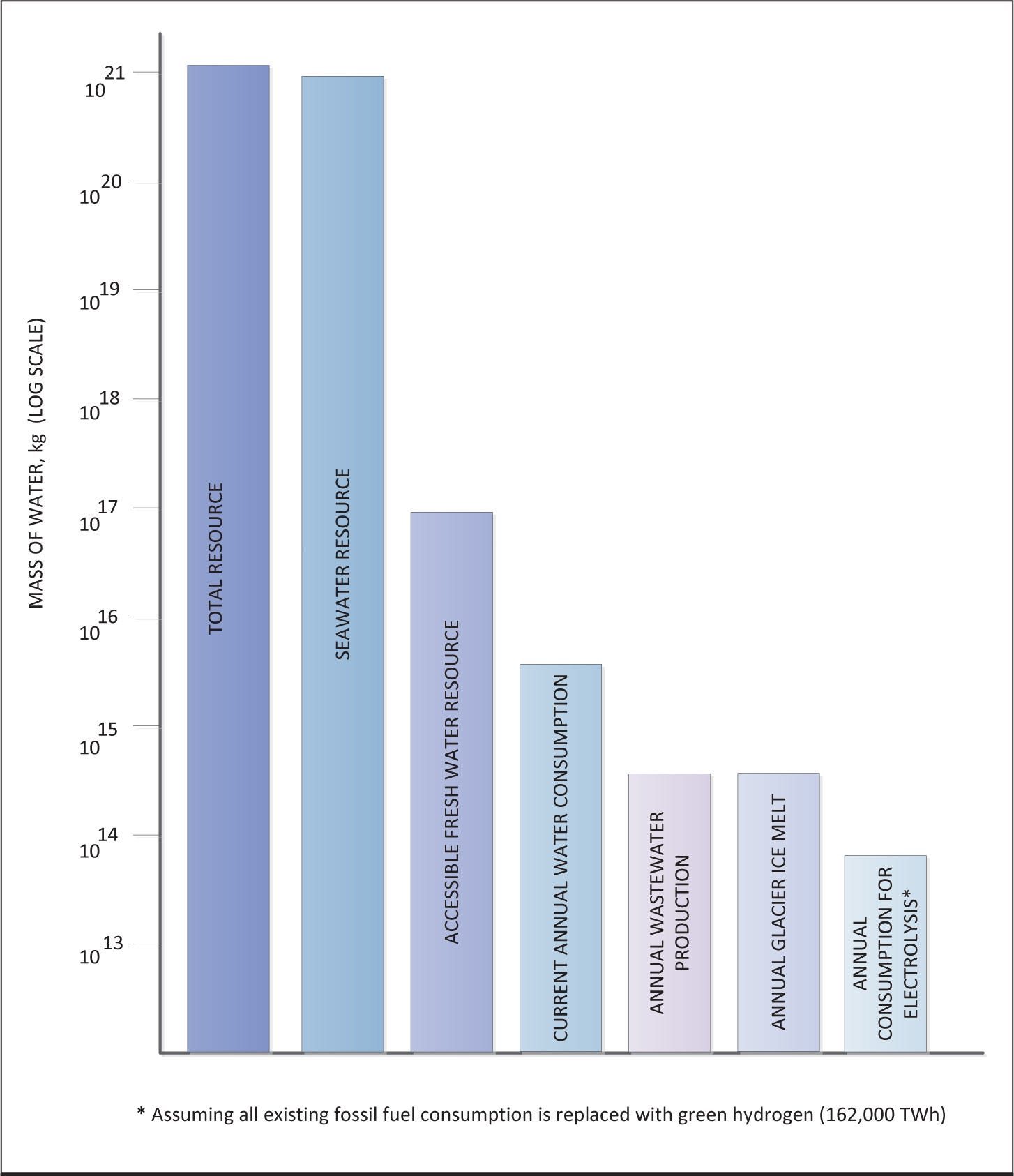Is a Green Hydrogen Economy a threat to Water Security ?
To produce green hydrogen, pure water is an intricate part of the process. It has been estimated that for every 1kg of green Hydrogen, 9kg of water is needed. Could this be a problem...
The technology for production of green hydrogen (known as an electrolyser) is both, as of now, energy and capital intensive1. What makes green hydrogen ultimately attractive towards a low carbon (Net Zero) future, is when produced in a climate neutral manner combustion emits water vapour. This is a contrast to existing fuels which have been proven to significantly contribute to Greenhouse Gas emissions that contribute to global warming. In addition, as an energy-carrier, hydrogen can be used to store, transport and deliver energy from other sources or derivatives.
The law of energy conservation: “Energy cannot be created or destroyed, it can be converted from one form to another but the total energy within the domain remains fixed”
For example, renewable energy such as solar and wind which can easily be generated in large quantities can be stored as hydrogen and then used for needs like methane, synthesis gas, liquid fuels, or chemicals production.
All good news? Surely.
Although hydrogen dioxide (H20) is ‘everywhere’ and the main constituent of Earth's hydrosphere - clean consumable water can be hard to source. For the production of hydrogen, it is estimated that the minimum water electrolysis can consume is about 9 kg of fresh water per kg of hydrogen [9kgH2O/kgH2]. it is predicated that Hydrogen demand by 2050 could vary from 150 to 500 million metric tonnes per year, so this 1:9 ratio is important to understand why hydrogen production will require secure, long-term access to water.
The climate neutral fuel has raised criticism especially in favour of nations with fresh water crisis joining the hydrogen market pool. In the meantime, the presumption that hydrogen will take up clean water was debunked in a recently published IRENA The Geopolitics of the Energy Transformation: The Hydrogen Factor it highlighted (see Figure 1) that across industries by 2050, the lowest estimated demand for clean water would in fact be from hydrogen production.

Africa has the most promising prospects for green hydrogen, even with a clean water crisis
With countries like Namibia boosting 300days sunshine, it is no surprise that the continent with its high solar intensity, wind and hydropower capacity is signalled to be a key player in the hydrogen economy. Though IRENA has identified agriculture as demanding a substantial amount of water over hydrogen, what’s the reality in regions rich in renewables where water security remains a challenge.
Egypt, Ethiopia and Sudan are still in turmoil over the Renaissance dam and war torn Congo’s Grand Inga Dam once completed is to be world's largest proposed hydropower scheme.

Meanwhile Southern Africa grappled with a regional water crisis due to severe droughts (intensified by climate change) has exhibited prospects to curb this crisis. Nations within the region have long established state of the art desalination facilities to take mineral components from saline water. This existing know-how fills the gap for technology advancement as countries like Namibia, now set to launch its first green hydrogen production plant in the Erongo region already has a desalisation plant2 existing.

Green Hydrogen, for Sustainable Development Goal #6: Clean Water and Sanitation
According to WHO, 1 in 3 people lack access to safe drinking water and fresh water scarcity threatens food security and nutrition for about 25% of the world population. The United Nations was not wrong in including clean water and sanitation for all as a SDG goal by 2030. The privatisation of water in countries like Zambia, South Africa and Uganda has led to water efficiency, encouraging sustainable management of water and amplifying the SDG #6 for sustainable water access for the population.
Although green hydrogen is a clean energy carrier, it is important to be realistic about the consequences of producing green hydrogen especially when considering a key component being water.
In oil producing countries, the volume of water used in the extraction of crude oil can amount up to 8 times that of the oil produced. The oil industry, depending on the oil recovery technique requires vast quantities of water. Assuming the demand for oil consumption is replaced with green hydrogen, and other low carbon fuels, the competition for water in the energy sector might neutralize. Also, as renewable energy systems like wind and solar need little to no water, the pressure for water consumption for energy could be significantly reduced.

Oil extractions were successful in building strong economies around them. However, we have seen first-hand the aftermaths of poor Corporate Social Responsibility. Exploration of crude and gas have negativity impacted host communities across the Niger Delta in Nigeria to Congo Brazzaville in DRC these regions have now become some of the poorest and conflict torn regions.
Although the future is very near for green hydrogen’s role in the journey to net zero through decarbonization, the viability of large scale commercial hydrogen projects must have secure long-term supply of water at the forefront of any investment through stringent feasibility studies.
So, renewable energy sources…check
Fresh water accessibility, check.
Corporate Social Responsibility to ensure sustainability in water low communities… we’re signally no loopholes #sustainableH2
In Nigeria, the northern region of the country has the highest solar radiation capacity. however, this region is also dry with low water supply as drought levels continue to rise across the Saharan desert. Therein, if speaking hypothetically a green hydrogen production site is located in a water poor area - generated clean water must accommodate for the communities (if applicable). It cannot be emphasised that resource rich countries in Africa have to ensure in a bid to play a key role in green hydrogen economy, see social sustainability as a key priority. A lesson learnt approach from oil spills leading to environmental pollution must be in place for sustainable hydrogen.
As the green hydrogen economy looms closer, national net zero/hydrogen strategies, project developments and feasibility studies - alongside renewable electricity access, water security must be accorded in an integrated manner for sustainability ahead of the priorities of a low carbon future.
till next time,
Oghosa
P.S: while on hydrogen and water, found something quite interesting; hydrogen molecules advertised as a revolutionary for human wellbeing to change the way we hydrate. reviews have said, it has a great taste with more hydrogen than H20. Would you try pure hydrogen water ?
As the market grows, the price electrolyser systems is expected to reduce. There’s a World Electrolysis Congress in May on Scaling Up Technology & Infrastructure whilst Bringing Costs Down
Research into Desalination, recycled wastewater and storm water are being explored as alternatives to relying on fresh water. These alternatives except storm water require electricity to process before becoming suitable for green hydrogen production


